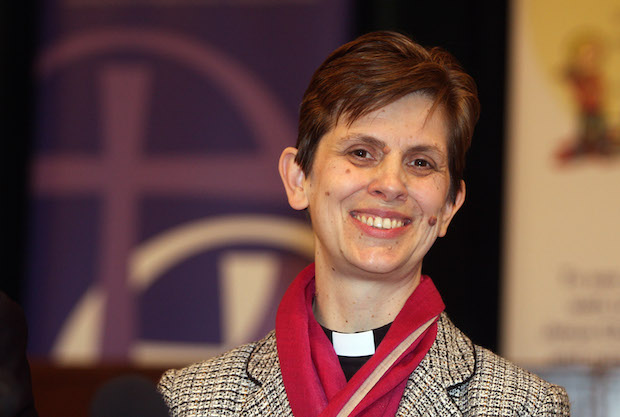Church of England’s first female bishop
Lambeth Palace announces appointment just four weeks after General Synod voted to allow women to become bishops.
The Guardian · London · 17 DECEMBER 2014 · 17:40 CET

The Rev Libby Lane, a parish priest from Crewe, is the surprise choice for the Church of England’s first female bishop. She has been appointed suffragan (assistant) bishop of Stockport, which the church counts as part of Chester diocese.
Her appointment brings to an end 22 years of resistance to the promotion of female priests. The General Synod decided in 1992 that women might be priests, but kept a glass ceiling in place, with the help of parliamentary exemptions from equality laws, for a further 22 years. This is at least 10 years more than anyone foresaw.
This appointment was the soonest that could possibly be made after the synod finally allowed women to become bishops in July this year. It took until November for the measure to become law.
As a suffragan bishop, Lane could be appointed without passing through the tangle of committee meetings required to choose a diocesan – one who has their own cathedral and may sit in the House of Lords.
Bishop of Chester, the Rt Rev Peter Forster, said she was the unanimous choice of the search committee. Her consecration will take place on 26 January 2015.
Lane said: “A remarkable day for me and a historic day for the church. Excited and a little daunted to be entrusted with such a ministry. Conscious of those recognised and unrecognised who have prayed and worked and suffered for this moment.”
Congratulations were tweeted by the prime minister, David Cameron, who described it as “an historic appointment”.
Hilary Cotton, of the pressure group Women and the Church, said: “The Church of England has shown a remarkable turn of speed in getting to this point only two years after the negative vote in November 2012. We hope that the pace of change will continue, enabling the Church of England to become a place where all women are fully valued as people of God, and where all their different roles and ministries are celebrated.”
The first diocesan appointment is expected to be in Southwell and Nottingham, where the shortlist is understood to have held two women and two men.
The archbishop of Canterbury, Justin Welby, has lobbied and worked with great energy for the acceptance of women since he took up the post in the wake of a stunning victory for conservative evangelicals, who managed to block earlier legislation in the synod in November 2012.
He and his fellow Old Etonian Cameron have also arranged for legislation which will allow female diocesan bishops to be fast-tracked into the House of Lords, without waiting their turn to be among the 26 longest serving who have places there.
In that time the initial surge of enthusiasm among women to join the clergy has subsided, so that although half of the clergy now in training are women, only a quarter of those under 30 are. This is partly because female clergy are much less likely to be paid for their efforts than men are.
About half of female clergy are unpaid. They are also less likely to hold senior positions. Although there is no block on women being cathedral deans, for instance, only three of the 44 English cathedrals are run by women today and the overwhelming majority of female clergy are not running their own parishes.
Welby has said that he hopes the House of Bishops will have a 50/50 gender balance in 15 years’ time. There is a very long way to go before he gets there.
Asked whether this appointment was not a rather empty gesture in the light of the disappointing statistics for women’s employment and promotion, the bishop of Chester said: “The church of England is a body that changes in a progressive but properly considered way ... in order to enable as many people as possible to live with the decision announced today. I think that where we go from here is not in any sense a gesture.”
Lane said she had been extremely fortunate in her own ministry. She became a priest in her early twenties, unlike other campaigners who had waited decades for that moment, and then had to wait decades for the promotion their abilities deserved.
“I don’t feel like a gesture,” she said. “It feels like God’s time in God’s plan. But I am very conscious of all those who fought and prayed and worked, and I hope my continuing ministry will enable others to flourish.”
Published in: Evangelical Focus - europe - Church of England’s first female bishop
